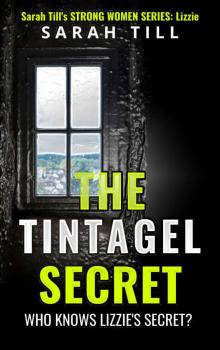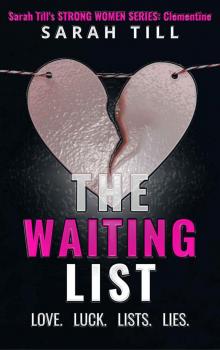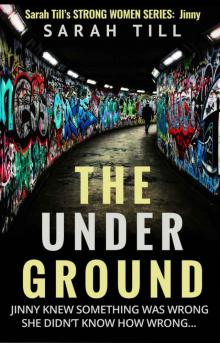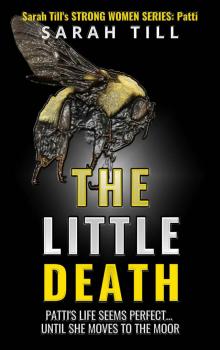- Home
- Sarah Till
The Tintagel Secret Page 2
The Tintagel Secret Read online
Page 2
Every so often I see an envious soul, a kindred spirit who understands that life for me is easy, as long as people leave me alone. I just go from day to day, doing the same thing. I know it's easy because I've had it hard. My family had gradually slipped away from me, and I need to get them back. My family. I think now about Julia, going home to her husband and telling him about me and her day and the murder. I expect the poor dead woman had a family, and I feel sad as I imagine Mia Connelly breaking the news to them. I miss Andrew at times like this. I need to get him back, to contact him. But it wasn't going to be easy. Not after what happened.
After I married Stanley, who was fifteen years older than me and the most boring person I have ever met, I sunk reluctantly into a mere of domesticity. I wrestled with my own expectations and those of the world, and, backed by Stanley, the world won. Two years later I was pregnant, and I gave birth to Andrew.
From the first moment I saw Andrew I was mesmerised. The umbilical cord, that connection of nourishment between him and me, may have been cut, but, like a phantom limb, it remained live between us. It was the first time I'd ever felt love. I'd cared for my siblings but we'd drifted apart, mainly out of dad's range; his violent outburst became worse as we became adults, and we were all a bit afraid of him now. I didn't love Stanley; this I knew for sure. He crushed me with his nothingness, him and the rest of the world, and had pressed my ambition out of me. But I loved Andrew, the idea of something that was mine. Belonging to each other, keeping us together and never to be separated. Most of all, I felt that I had been given a second chance. Nothing could have dampened my elation at Andrew's birth; he was a new project that I could apply myself to, a new curiosity that answered its own questions,
But I have a spectacular talent for misunderstanding; I thought the time I spent with Andrew made him mine exclusively. All the time reading with him, preparing him for the world, telling him the best of my father's stories, I thought they would make Andrew mine. One misunderstanding, one incident that was never fully explained changed everything. When Andrew went to school, I engaged a private tutor. I was worried that I wouldn't be able to keep up with Andrew's homework. And I feared telling Stanley as he'd think I was stupid. Somewhere inside me things are still Top Secret and, frightened of my Dad's hand, I don't divulge anything unless I am asked. And this was to be my downfall.
One day my tutor, a young English Literature graduate called Brian Jarvis had been to the toilet just before leaving and I had been putting some ironing away. That's the problem with secrets, they can become too easy, too familiar. I came out of my bedroom just as he left the bathroom and for a second our eyes met. There had been nothing more than a glance and a brush of shoulders. But Andrew had, meanwhile, come in from school and stood at the bottom of the stairs staring at us. He came upstairs and I could see, at that moment, that he hated me.
I didn't see Andrew for the rest of the evening, and he ignored me for days. One the Saturday following the incident, Stanley lowered his newspaper long enough to look over his glasses at me as I passed.
'Who's is it, Elizabeth? Who is this man that Andrew has seen you upstairs with?'
I blushed and made it worse.
'I've hired a tutor. To help me with understanding Andrew's schoolwork.'
He stared at me.
'Have you been sleeping with him?'
'No! Of course I haven't. How could you think that?'
He smiled slightly.
'I didn't think that. Andrew did. He asked me if you were going to have an affair, like John Culver's mother. If you were going to leave. So. Are you?'
I felt my neck burn with red temper.
'No! Course not. I've been learning English. That's all. Whatever you think of me, Stan, I'm not an adulterer.'
He lowered the paper a little further.
'No. I didn't think so. I can't really imagine that anyone would be interested. After all, you are a little bit strange, Elizabeth.' He could have added that, after all, he wasn't interested, but he didn't. It stung anyway, but there it was. I expect he was angry, and that's why he said it. It didn't matter. I knew that there had been a moment, and maybe Andrew had sensed that it could be more, and worried.
It rankled at me and I decided to speak to Andrew. He was twelve, and just that morning he had told me he didn't want trainers for his birthday, but a pair of leather brogues like Dad's. He was in the kitchen, making his packed lunch for school and folding the sandwich bags immaculately. It seemed an opportune time. I rested my bottom on the oven door, just like my mother had done years before, and took a breath.
'Andy.'
He turned and faced me, chin upwards.
'Andrew. Not Andy.'
'OK. Andrew. I just wondered why you had mentioned my tutor to your Dad? Why you thought I was having an affair like your friend's mother? I'm not going to go away if that's what you're scared of.'
He stared at me.
'Oh. Should I have kept it a secret? I've read about your secrets, in your diary in Grandma's paint box.' My mind raced along the words, trying to remember what I had written. I couldn't have written it down, dirtied the white page with what happened, could I? Andrew continued. 'Anyway, I don't care. Do what you want. I'll live here with Dad. I'm going to go and work with him at his office.'
Stan was in insurance. It was a good, steady job for life. Exactly what I dreaded for Andrew.
'But don't you want to travel, have a bit of excitement? You know, before you settle down?'
He laughed a high twelve-year-old giggle, a sound that made what he said to me next all the worse.
'What. Like you? Dreams are ten a penny. Dreamers end up like you, insignificant. Inconsequential.'
These were Stanley's words, his defence against anything vibrant or alive.
'That's not very nice. I'm not insignificant. Don't say that about me, Andrew.'
I could see the tears prick his eyes and his cheeks flush.
'Dad says you are. He says you're not a woman. A real woman keeps house and gets things done. He says you're airy-fairy, always reading and painting something instead of looking after us. Staring into space. He says there's something missing. He says he wishes he never married you.' He fiddled with the button on his school blazer. 'I'm going to find someone who isn't like you. Someone normal. And you were upstairs with that man. And I'm going to tell everyone.'
He ran out of the kitchen that out of the house, and into the garden where he stood sobbing until I came out of the house to take him to school. I took my time. It was the first time someone, my own child, had challenged me with the word 'normal'. I leaned against the oven and sung in my head. I swayed backwards and forwards feeling the warmth radiate through my body. It was only in that moment that I completely understood my mother. When I got back from school, I ran upstairs and read every part of my diary, scouring the pages for any details Andrew might have read. Only then did I fully exhale as I realised that, after all, there were no details and my Top Secret was still locked inside me.
We never spoke of it again, but as the years Andrew drifted away from me. Like any mother, I examined every minute aspect of my parenting; the only thing I could think of was that my real desire, my desperation to be free, was showing through. I'd built a shell around myself, a thick cocoon that stopped me from stepping out into the world. I held myself very still, with perfectly coiffed hair and pristine clothing within these confines, because if I dared to step out, my hair would uncoil and my legs dangle too far below my hemline. I might say something that would cause Andrew and Stanley to look at me as if I was a curiously exotic animal in a cage. My only revenge was that I carried on studying with my tutor, but this time I went to his flat and our eyes never met again.
I held in any desire to be spontaneous. In fact, I held in any desire at all. I imagined that other people's lives were exciting, that they were all having torrid sex as Stan and I were sipping our hot chocolate in bed. We kept up our holidays to Tintagel, but, in the absence of my p
arrot-fashion narrative about King Arthur, it was just dutiful trekking from one place to another with Stanley looking at his watch.
I'm still shuffling along the pavement now, the sea breeze whipping me. Shuffling is part of the bag-lady code, and I feel obliged to continue as Julia Scholes runs up the main street behind me, coiled for an attack. She's a pretty little thing with blond curls that bob up and down as she comes up behind me.
'Lizzie. For the last time, stay out of the town. You're scaring the tourists away. I know you had something to do with the murder. I saw you up on the headland. Please, stay away from my shop, I’m asking you nicely.'
She is asking me nicely. Her voice is even but her words are horrible and cruel. What have I ever done to her? All eyes are on me now, waiting for an explanation or, better, a denial, but the words won't come. I utter a few words under my breath and hurry on. Julia is still behind me, and she produces a rolled-up newspaper. She begins to hit me around the head, even though her voice is still even and reasonable.
'Shoo. Go on. Shoo. Away. We don't want your kind round here.' A small crowd gathers and she's satisfied. Arms crossed, she stands back. 'See what you've done now? All these people are disgusted. Go away Lizzie. You don't belong here.'
I used to think there was an answer to every question in the world, and that someone, somewhere, must know that particular answer. Yet, in the whole wide scheme of things, it turns out that there are a lot of situations that defy explanation. One of them is why I can't see my family, although I do kind of know the answer to that one; less said, soonest mended. If I contact them then it will bring it all up again and someone might remember the day I disappeared on our family holiday. Another one, more current right now, is how I manage to get beaten to the ground by a woman with a copy of the Tintagel Herald. And she somehow feels that it's my fault. I'm sitting here with my white lace-up pumps pointing North East and North West, checking to see if anything hurts, when Alice Taylor appears from the doorway of her trinket shop.
'OK, people. Nothing to see.' Alice is lovely. She’s the voice of reason for everything, a kind of life referee. She reminds me of the policeman at the murder scene and that Julia always seems to be in the thick of trouble. Alice waves the small crowd away and helps me up. 'You all right, Lizzie? Can I contact anyone for you? Do you want to go to hospital?’
Julia interrupts.
'Good idea. They might bloody keep her in. Section her. She needs sorting out, she does.' She moves very close to my face and speaks to me loudly but very slowly. 'Stay out of town, Lizzie. We're going to have a meeting about you. The Community Committee. See what we can do about you.'
I nod. It's par for the course. Alice stands in front of her.
'She's a human being, you know. Haven't you got any compassion? You've just assaulted her.'
'She's been assaulting my eyes for years now. And I daresay she's had something to do with that murder. I wouldn't put witchcraft past her. Look at her. She's up there at all hours then someone's found dead. Can't be a coincidence, can it? Her and them bloody birds flying round her head. She shouldn't be encouraging them birds, flying rats they are.' Some of the shopkeepers are nodding and agreeing, and I can hear someone talking about a homeless hostel and welfare benefits. 'Someone has to do something. She can't stay here forever. She's making the town look untidy. She doesn't belong here.'
Problem is, I do belong in Tintagel. If I was here by choice, I would have moved on at the first sign of trouble from Julia and here committee. But part of me is here, and I can't leave any more than I can change history.
CHAPTER 3
No sooner have I left the High Street and ambled up to the beach than I notice the note. I untie the string that is wrapped around a plastic envelope with a stud fastening. I can see the looped writing before I open the envelope. It's a simple message photocopied onto white A4 paper in large block capitals, just like all the previous ones:
'Kill You Next Time.' Then, scrawled underneath in loopy handwriting:
'I just want what's mine.'
I sigh and shake my head, and something inside me quivers. My head's reeling with the fact I'd seen a dead body, close up. Apart from Stan, I'd never seen a dead body before. I'd been accused of murder, and only I knew that I'm under someone's reign of terror too. But why would anyone want to kill me? I've been receiving similar notes, sickening blood covered pieces of paper. Some tied to the legs of dead birds and some scraped in crushed butterflies, tiny fragments of their beautiful wings glittering next to the message on the lined paper. All the notes I had received told me I had an item someone wanted and they intended to get it back. I didn't know what this item was, but I certainly knew that whoever was writing the notes was persistent. And they must be here in Tintagel, amongst the surfers and beach bums, shopkeepers and holiday-making couples.
I had a big stack of notes in a plastic bag, saying 'Kill You Next Time' and another stack demanding that I must give someone 'the item'. The bloody item. I honestly couldn't think what they meant at first. I've never had anything of value in my life, except for Andrew. I sit down now on the warm sand and wrack my brains again. What could I have that someone else would want so badly?
When Stan had died, he had left me a fair amount of money, and that's how I ended up here, in Tintagel. Andrew had inevitably blamed me for his father's heart attack, publicly citing my 'numerous affairs' to anyone who would listen. The funeral was horrible; my father and brother John stood on the opposite side of the grave while Andrew watched us scowl at each other with glee. Even though only two people knew the cause of the drift between us, the others sensed it and joined in. My father didn't speak to me and John brushed my shoulder with his as they left the wake. His mouth came close to my ear and I heard him murmur 'Morgana'. Weeks after the funeral I saw John waiting for me at the end of the road in his car. I pretended not to see him, but his eyes followed me and I could feel the familiar boring into my back as I passed the car. I heard the door slam but, thankfully, no footsteps.
'I know you've got it.'
I turned around.
'What?' I was genuinely confused, because 'it' could have been a number of things. Stan's money, Dad's Parker pen, Mum's paint box, or a big fat secret that he had finally put two and two together and realised. But as he was always going on about that bloody paint box, I fixed on this.
'The paint box? I threw it away years ago. I've been married for a long time, and now Stan's gone. I don't keep crap from my past John. You might have noticed that from the lack of contact.'
For me, this outburst was monumental and I reeled backwards at my own words. But he just laughed.
'No, you haven't thrown it away. Andrew says you've still got it. And as for your Happy Ever After, he told me how you'd been fuckin' your English teacher. Or was it his English teacher? Anyways, like mother like daughter. You're a dirty fuckin' slag just like your mother. So, give me the box. I just want to give it back to Dad, not that you give a shit about him.'
I stared at the floor, my face blotching with nerves.
'No. It's mine.'
He flicked a dog-end towards me.
'OK. It doesn't matter anyway. I'm not really arsed. I'll just get Andrew to get it for me.' He walked right up to me and grabbed my arm. 'Bye, Morgana. For now.'
I ran into the house and started to go to find the box, then realised that Andrew would be home any time. I waited until the next day, when Andrew and John were out of the way. Then I emptied the contents of the box into a plastic bag and replaced them with newer paintbrushes and a few pastel blocks I had half used. He'd never know. Of course, I'd tipped out a couple of thimbles she'd collected, and some shiny pebbles with it, into a Tesco bag and behind a loose panel in my wardrobe.
At the solicitor’s office later that week Andrew tapped his foot constantly, counting down the moments before Stan's will was read. It was a week between the funeral and the reading, and he studied me for the whole time he was at home, his face set in smugness. But it
was as exactly as I had thought. Stan had left the house to me, as well as some insurance and all his belongings. There was no message of love, no trinket to remember him by, but why would there have been? Stan and I understood what had happened between us, and the stark closure of money fitted with our tepid romance. He had left Andrew a generous amount which he could access immediately. It wasn't a fortune but was in keeping with Stan's mentality. He knew Andrew and I had and his knowledge mirrored the responsibility he handed to his son. Just enough, not too much.
So, I had a small amount of money, but, as I said, it was gone now. Apart from that I had nothing. No jewellery to speak of, and no precious little artefacts that anyone else would risk their liberty to get from me.
It seems to me that people are obsessed with 'stuff' and will do anything to get it. Only once before had I seen someone come to blows about 'stuff'. My parents, poverty stricken at the best of times, suddenly became angry and violent about what belonged to whom when my mother broke free. Bits of paint and scrappy steel suddenly became objects of deep desire as soon as ownership was to be decided.
My mother had left some boxes in the attic, the paintbox that John wanted so much amongst them, and one day when I opened it, I found some watercolours and a palette. Her work was in the bottom of the box, torn into a million tiny pieces by my father, jealous of any remaining part of her soul. I'd torn up some wallpaper and painted tiny scenes on the back of it before rolling it tightly back into the paper tube. Painting pictures had occupied my mind, kept me from my demons, until one day, just before I met Stan, I found my elder brother John papering the back bedroom with it. As usual, he smirked at me, a broad grin that told me he knew things about me and that if I should tell, he would make sure I was sorry. I remember thinking it was a good job I'd taken a small gold looking object. A kind of an abstract crush of some unknown metal, out of the box when I first found it years ago. And pushed it down my pants. It and the paint box became the only thing I had of my mother's, and now only I knew where the shiny trinket was. But, that day, John had once again overpowered me.

 The Tintagel Secret
The Tintagel Secret The Waiting List (Strong Women Book 5)
The Waiting List (Strong Women Book 5) The Under Ground (Strong Women Book 4)
The Under Ground (Strong Women Book 4) The Little Death
The Little Death